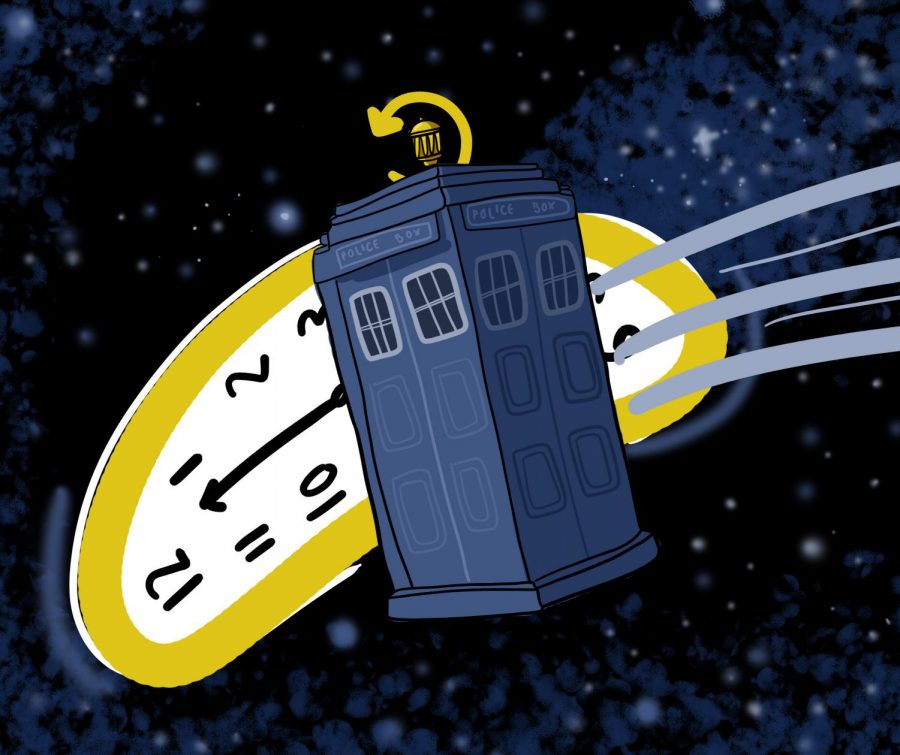The Wibbly Wobbly Timey Wimey Nature of Time Travel
April 2, 2018
“Greetings. I am a time traveller from the year 2036. I am on my way home after getting an IBM 5100 computer system from the year 1975.”
Fans of supernatural activity were completely captivated by this message, which was posted to Post2Post Art Bell Forum on Nov. 2, 2002. It officially surfaced the curious case of John Titor, who claimed he was sent back in time to retrieve a laptop. In the post, he also gave insights into what the future is like, causing speculation and investigation by fans that lasted more than 10 years.
Titor’s effect on people died out as his predictions never happened. However, more evidence of time travel has popped up on social media, from hipster men photographed in the 1920s to a mummy found in Mongolia wearing Adidas shoes.
People have different opinions about time, some believe there is a beginning of time and it goes on almost like a ray. Some — including Albert Einstein — believe that time is an illusion, and others believe that time is nonlinear — the past, present and future are happening all at once. These people believe that there is no time, just existence.
“Human experience of time is itself quite complex — more complex than we imagine,” Adjunct Instructor at Center for Experimental Humanities and doctoral candidate Leo Goldsmith said. “We experience it as essentially linear, but it’s always troubled by memory. And memory, it seems to me, is not just about recalling past events, but experiencing different times in the present — that is, it could [be] past or future. Anyone who has ever experienced déjà-vu — or watched Twin Peaks — can tell you that.”
Adding to the conversation about the conundrum of time is a group of people that set forth the theory that time travel can happen and has happened.
According to Associate Professor of Physics at NYU Shanghai Tycho Sleator, anyone can travel into the future, but not to the past.
“It’s possible to travel through time more slowly by changing your motion,” Sleator said. “That is, accelerating objects age more slowly than an object moving at constant velocity. For example, if one person travels to a distant planet and back at a speed close to the speed of light, that person will be younger than her twin sister who stayed at home.”
That being said, Sleator does not believe in conspiracy theories about time traveling.
“I think not,” Sleator said. “It’s conceivable. There are objects called wormholes that might allow one to travel from one place at a particular time to another place at an earlier time.”
According to NASA, wormholes that connect between points in time and space is a possibility for time travel. However, the current technology is not developed enough to create wormholes that would not collapse as fast and would allow bigger particles to travel. Other ideas like physicist Frank Tipler’s Tipler’s Cylinder, Stephen Hawking’s theory on black holes and Tom Kibble’s Cosmic String Theory have all offered up potential ways to time travel. However, all of them were stalled due to inchoate technology.
CAS sophomore Rahat Hossan is skeptical of the scientific possibility of time traveling.
“Atoms are [constantly] splitting, adding and rearranging everywhere,” Hossan said. “To be able to go back in time implies that these atoms will move back in motion, a phenomenon that is quite unheard of and impossible.”
For Tisch sophomore Brian Cheng, Stephen Hawking’s book “A Brief History of Time” and reading about black holes are evidence enough for him to consider time travel as a possibility.
“The alternate universe theory posits that there are a number of alternate universes which simultaneously exist in multiple timelines,” Cheng said. “The existence of time dilation in black holes proves that time can be manipulated to the theory of relativity,;however, it would require a sh-t ton of power.”
Tisch sophomore Charles Lee believes in time travel but said he can understand why many are skeptical.
“We can only quantify it with a limited scope, so how can we expect to master it and travel through?” Lee said. “Many of who disagree are really afraid of the temporal ramifications time travel has.”
CAS sophomore Doug Braff offers a solution to Lee’s thoughts on the ramifications of time travel.
“One possible solution to this could be the use of a silent drone or land-air nanobot with a cloaking device,” Braff said. “This would dramatically reduce the chance of human error and the chance of significantly altering the present and/or the future, since the amount of potential interactions with the past would be very limited.”
It can be concluded that time travel is directly correlated with a person’s understanding of time. Whether Titor actually traveled back to the ‘70s to retrieve a laptop was never refuted, but that is not to say it happened. We just have to accept the wibbly wobbly, timey-wimey — meaning non-linear, non-subjective — concept of time and time travel.
Read more from the Washington Square News’ Conspiracy Feature. Email Yasmin Gulec at [email protected].

























































































































































